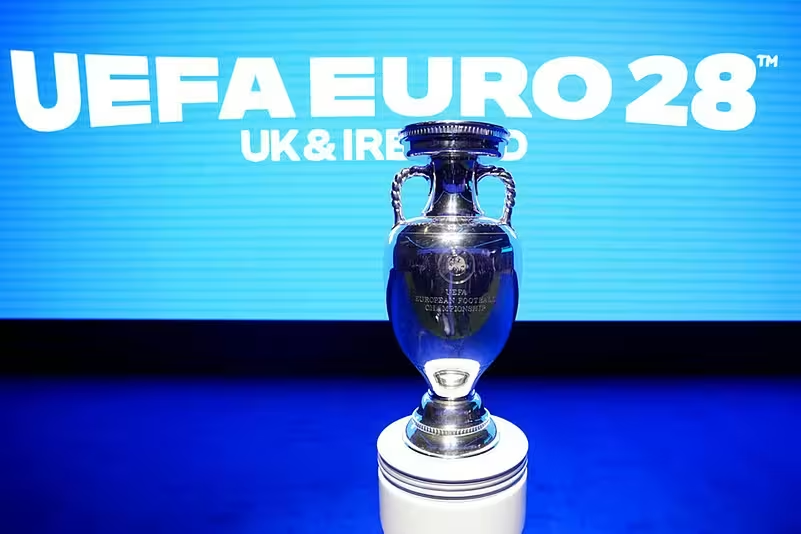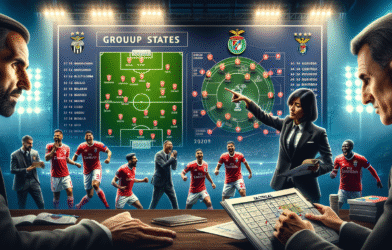Subtotal $0.00
Overview
Scope of the Euro 2028 schedule
In a bold multi-nation format, the Euro 2028 schedule will be staged across England, Wales, Scotland, and the Republic of Ireland, with nine venues hosting matches. The approach underscores a festival-like atmosphere, designed to bring the continent’s premier national-team event closer to fans on both sides of the Irish Sea. At the heart of the plan are marquee venues such as Wembley in London and Hampden Park in Glasgow, alongside a mix of city stadiums that spread the tournament footprint across Britain and Ireland. The Euro 2028 schedule aims to maximize accessibility, reduce long-haul travel for some supporters, and stimulate local economies in host cities, while preserving the tournament’s iconic drama.
As organisers outline the Euro 2028 schedule, the calendar will also be calibrated to balance traditional powerhouses with rising teams from emerging markets across the four nations. The distributed model is designed to create a continuous festival feel, with strategically placed matches enabling fans to attend multiple fixtures in a single trip. A key element of this plan is a pledge not to use dynamic pricing for ticket sales, a decision that addresses past complaints about price spikes driven by demand. For supporters, the opening chapters of the Euro 2028 schedule promise affordability and fairness alongside world-class football. UEFA Euro 2028 coverage will provide further context as official details are released.
Ticket pricing pledge
The commitment to a non-dynamic ticket pricing model is a centerpiece of the Euro 2028 schedule. Organisers promise stable price bands that shield fans from abrupt spikes caused by demand surges. While official categories, bundles, and sale windows will be announced in due course, the overarching aim is to deliver predictability and fairness across venues in the four nations. The absence of dynamic pricing should help supporters budget for travel, meals, and merchandise as part of a comprehensive matchgoing experience.
Promoters emphasise that pricing will reflect the value of elite football without penalising casual fans. Early-bird sales, family packages, and multi-match bundles may be introduced to broaden access. The policy aligns with a broader trend toward fan-centred reforms in major tournaments, balancing commercial needs with the loyal base of supporters who travel year after year. For those planning trips, it is welcome news that the Euro 2028 schedule includes predictable cost structures and transparent terms.
Venues and host cities
Distribution of venues and host city strategy
England, Wales, Scotland, and Ireland will share hosting duties across nine stadiums, including Wembley and Hampden Park. The cross-border spread aims to bring matches nearer to fans, reduce travel burdens, and spread the festival vibe. The schedule is designed to promote city centre activations, fan zones, and local businesses, ensuring that the tournament economy reaches multiple urban centers, not just capital cities. The choice of venues reflects a balance between capacity, transport links, and historical significance, with big nights in renowned venues alongside more intimate settings that can still deliver a high-stakes atmosphere.
Crucially, the Euro 2028 schedule will be matched by a robust transport and accommodation plan. Officials are eyeing efficient rail connections, dedicated matchday routes, and a stepped approach to hotel availability in host cities. A cooperation framework with national and local authorities is expected to govern crowd management, security, and accessibility. The aim is to keep matchdays smooth and affordable, with smart operations that anticipate peak periods and minimise disruption for residents. Fans can look forward to a coherent, multi-city experience that preserves the event’s prestige while expanding its reach.
Transport, accommodation, and fan zones
Fan zones will become a signature feature of Euro 2028, offering free or low-cost screenings, food options, and cultural activities near stadia. Cities will also boost rail and bus services to curb car congestion on match days, accompanied by clear signage and travel information. Accommodation partners are expected to offer competitive packages that blend stadium proximity with city-centre convenience, ensuring options for families and budget travellers alike. Accessibility will be a priority, with clear information on seating, facilities, and dedicated support for fans with disabilities.
The nine-venue model hinges on effective cross-border logistics. Organisers plan dedicated shuttle corridors linking major hubs, stadiums, and airport gateways where possible. The Euro 2028 schedule is crafted to minimize long journeys between fixtures, helping supporters attend multiple games without exhausting travel. By leveraging well-connected host cities and a thoughtful events calendar, organisers expect sustained engagement from fans long after the final whistle.
Ticket pricing policy
Transparent pricing bands and sales windows
The commitment to a non-dynamic ticket pricing model is a centerpiece of the Euro 2028 schedule. Organisers promise stable price bands that shield fans from abrupt spikes caused by demand surges. While official categories, bundles, and sale windows will be announced in due course, the overarching aim is to deliver predictability and fairness across venues in the four nations. The absence of dynamic pricing should help supporters budget for travel, meals, and merchandise as part of a comprehensive matchgoing experience.
Promoters emphasise that pricing will reflect the value of elite football without penalising casual fans. Early-bird sales, family packages, and multi-match bundles may be introduced to broaden access. The policy aligns with a broader trend toward fan-centred reforms in major tournaments, balancing commercial needs with the loyal base of supporters who travel year after year. For those planning trips, it is welcome news that the Euro 2028 schedule includes predictable cost structures and transparent terms.
Bundles and accessibility measures
In addition to base ticket pricing, organisers are exploring bundled options that combine group seating, hospitality, and transport. Bundles could make attending multiple matches more affordable, especially for families and groups. Accessibility reductions for disabled fans, senior citizens, and youth groups will be central to the pricing strategy, with targeted pricing bands and dedicated allocations to ensure inclusivity. Details on how bundles will be allocated and sold are expected in official releases, along with information on electronic distribution and secure payment options.
The ticketing framework will also consider return trips, special matches, and potential cross-border sales channels. By focusing on a clear, transparent policy, Euro 2028 aims to prevent confusion on pricing and preserve the tournament’s inclusive spirit. This approach supports the Euro 2028 schedule’s broader objective of making top-tier football accessible to a diverse and expansive audience.
Fan experience and accessibility
Accessibility for fans with disabilities and inclusivity
Fan access to venues will be enhanced through improved mobility options, dedicated seating, and clear wayfinding. Venues across the four nations are expected to raise the standard for accessible infrastructure, ensuring sightlines, step-free routes, and inclusive amenities. Ticketing processes will be designed to be user-friendly, with assistive technologies and dedicated support staff available at all times. The Euro 2028 schedule aligns with universal design principles to ensure that fans of all ages and abilities can enjoy world-class football without barriers.
Beyond physical access, organisers are emphasising inclusive programming in fan zones, digital platforms, and match-day experiences. Language support, accessible transport information, and stepped pricing for vulnerable groups are part of the broader strategy to make Euro 2028 schedule events welcoming. Engagement with disability rights groups and local communities will shape ongoing improvements as the tournament approaches.
Fan zones and matchday experience
Fan zones will offer experiential spaces for supporters to gather, watch games, and participate in cultural events before and after matches. These zones aim to mirror the excitement of the stadium atmosphere, with food stalls, live music, and interactive games. Efficient crowd management and security will be essential to ensure safety while preserving the festive mood. By design, the fan experience is envisioned as a family-friendly proposition that complements stadium attendance and offers a social hub for visitors from across the four nations.
Matchdays will be planned to balance tradition and modern fan needs. Clear communications on transport options, timings, and stadium policies will help visitors plan their days effectively. With the Euro 2028 schedule guiding the experience, organisers intend to deliver a cohesive sense of national pride as fans move between locations for different fixtures. The ultimate goal is to weave football into local life, sustaining enthusiasm from the opening game to the final whistle.
What’s next for Euro 2028
Official releases and timelines
As the Euro 2028 schedule crystallises, officials are expected to publish more granular information on ticket categories, allocation, and sale windows. The next wave of updates will outline match-by-match itineraries, hospitality options, and transport guidelines. Fans should monitor official channels for precise dates and purchasing windows. The scheduled announcements will help supporters map out trips, predictors, and budgets for the tournament, reinforcing confidence in the process as the Euro 2028 schedule evolves.
In parallel, national associations and host cities will finalise infrastructure and operational plans. Stadium readiness, security protocols, and volunteer programs will be tested through simulated events and pre-testival activities. As detail emerges, the football world will gain a clearer picture of how the event will unfold across nine venues and four nations. The forthcoming releases will be crucial for fans, media, and partners planning coverage and engagement. For continuous updates, refer to the official Euro 2028 page and trusted outlets such as UEFA Euro 2028.
Engagement with local communities and future updates
Beyond the pitch, Euro 2028 aims to create lasting legacies in host communities. Engaging schools, clubs, and local businesses, organisers plan outreach programs, coaching clinics, and cultural events that extend the tournament’s impact beyond matchdays. Expect ongoing consultations with fan groups to refine pricing, ticketing procedures, and accessibility services. As local voices contribute to the plan, the schedule will continue to adapt, with updates issued through official channels and partner outlets. The result should be a more connected, responsive tournament that resonates across all four nations.













